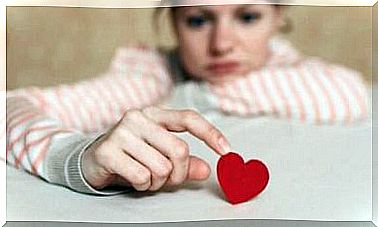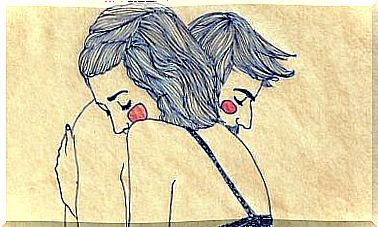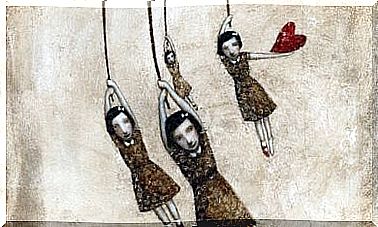The Experiment: A Movie About Human Nature
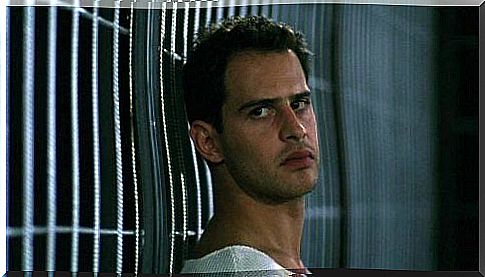
The Experiment is a 2001 German film about human nature. The director of this film was Oliver Hirschbiegel. It is based on the play The Black Box. This play was inspired by a real experiment performed at Stanford in 1971.
This experiment has been widely questioned. The film is quite different from what actually happened. Yet it prompts us to wonder what human nature really is. Are we good or bad? Are there good and bad people? It is undoubtedly a film that deals with philosophy, ethics, morality, sociology and psychology.
The film starts with the presentation of Tarek Fahd, a taxi driver with money problems. He decides to earn some extra money by participating in an experiment related to human nature. However, he will not be paid just for the experiment.
Tarek Fahd also decides to record everything that happens. He wants to use this data for a publication in a newspaper for which he had previously worked. The money encourages the participants to participate in the experiment just like guinea pigs. Ultimately it will destroy their lives.
The participants in the experiment
The participants are vastly different: a taxi driver, an airline clerk, an executive, an Elvis impersonator, and so on. They all want to experience something new. However, they mainly seek monetary compensation. These participants will undergo various psychological tests. They will also go through some interviews.
This will be decisive for the role they will take in The Experiment: prisoner or jailer. We will see that some participants doubt themselves. Others have tremendous confidence in themselves. The doctors in charge of the experiment will use this information to assign the roles.
None of the participants has previously served in prison. None of them seem to be a person that one would consider to be out of the ordinary. They all have a job and a family. In short, they all lead a very normal life.
When they get to know each other in the waiting area, they seem to be engaged in a pleasant conversation. They show interest in getting to know each other. This is before they know which roles they will be assigned. What initially seems like a game eventually turns into a nightmare. It will make us think about some aspects of human nature.
The Stanford Prison Experiment
The film is therefore based on a real experiment. It was performed in 1971 at Stanford University in the United States. The head of the experiment was Professor Zimbardo. 24 students took part. They were all psychologically stable. However, the experiment quickly got out of hand. The people who participated all submitted completely to the rules assigned to them.
This experiment has been questioned and criticized for exceeding the limits of ethics. However, the results were so surprising that they made us think about the role of society. How is it possible for completely normal and healthy individuals to become sadistic and violent? What happens when we deny an individual his freedom?
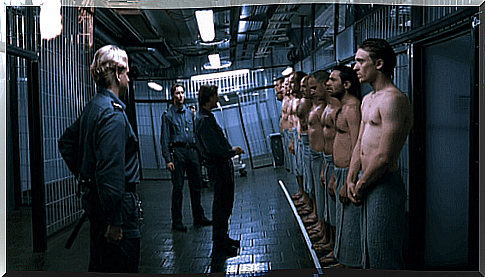
Many participants suffered from severe psychological consequences. Those who took on the role of prisoner immediately became submissive and gave up their freedom. The jailers began to abuse their power and apply very cruel punishments. The film shows us a little bit of insight into this experiment. However, there are some differences:
- In the original experiment, the division of roles was random. However, the contestants in the film were assigned roles based on a series of tests they conducted.
- In the Stanford experiment, the inmates were arrested as if they had committed a real crime. This doesn’t happen in the movie. They were not assigned their role until their participation in the experiment was accepted.
- The only surveillance we see in the film is surveillance cameras and the three doctors who oversee the experiment but don’t intervene. At Stanford, Zimbardo himself participated as a guard. In addition, two real police officers supervised.
The Experiment and Social Roles
The Experiment takes us to a fictional prison. The decors are really chilly. There are almost no warm colors in any part of the film. They aren’t even there before the experiment starts. The 20 participants must spend 14 days in a fictitious prison.
The guards will not be given any orders except for one small line about the prison. In addition, they can do anything they want when a prisoner disobeys. Yet they are warned not to use force.
On the other hand, the prisoners are completely deprived of their identity. They no longer have a name and become nothing more than a number. They are not allowed to wear their clothes and only use a thin robe. The guards wear uniforms.
At first, many of them see it as a joke. They think it’s nothing more than a game. They also think they can go back home after a few days. Everything will then be back to normal. However, all this will make them a few dollars richer.
Yet we see how some participants take their role seriously from the moment they are assigned it. When they are prisoners, they become more submissive. If they are jailers, they become more authoritarian. As the film continues to evolve, it takes on a more dramatic and claustrophobic tone. It shows us the sadism and abuse of power among the jailers. At the same time, it shows us the suffering of the prisoners.
The unpredictable human nature
Some inmates have more trouble getting into their roles. On the other hand, the guards seem to feel very comfortable in their role. Most guards are still children. They have family and a good job. However, when they get some power, they act in ways they never imagined. They resort to extreme levels of violence and subject the prisoners to atrocities.
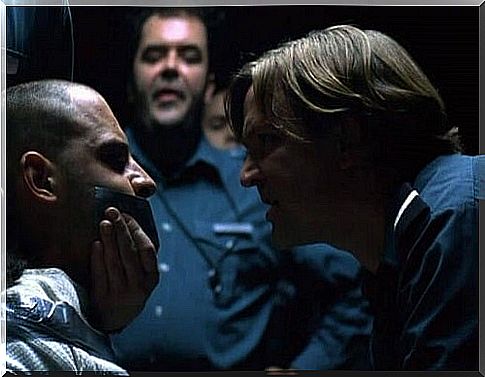
As the days go by, the situation becomes more difficult. The abuse is increasing every day. Every day the suffering of the prisoners increases. In a way, Tarek creates some situations. He tries to get a good story for the newspaper. However, we see that the hallucinations and the ideas of conspiracies captivate all participants. This causes them to act in unforeseen ways.
A society without freedom
One of the most interesting characters is Berus. He works for an airline. This makes us think he is psychologically stable. Yet he is the cruelest of the guards. He becomes the leader of the guards. The rest of them will accept his leadership without complaint.
The Experiment shows us a society without freedom. People are just numbers and lose their identity. They are assigned a role and then behaved according to that role. In the end, they play this role even though they know it’s not real.
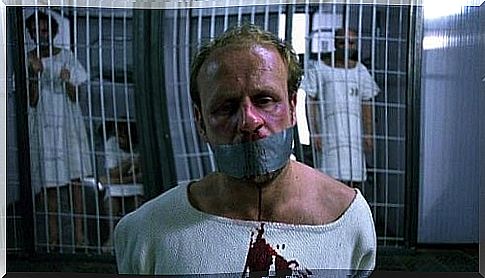
Many of us will try to explain it in different ways. Even though we consider ourselves perfect, we cannot predict how we would act outside the norm in an uncontrolled situation.
So it seems that many of us assume that there are good and bad people. Moreover, we certainly do not see ourselves as bad people. However, do we really know our own nature?
Are we really free?
The film and the experiment ask us to consider whether we are really free. Do we really have the free will that philosophers talk about so much? Do we really know what human nature is? Do we behave in complete freedom?
Perhaps we are simply victims of a role that has been assigned to us and we behave in accordance with that role. The Experiment invites us to ask unlimited questions about our own nature and our freedom.


